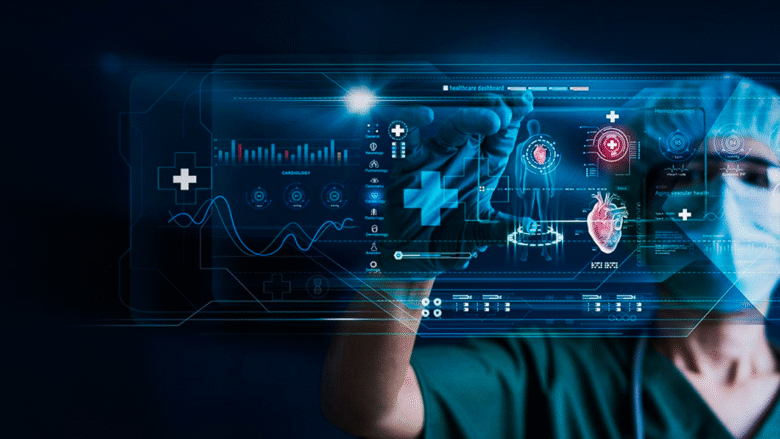Artificial intelligence (AI) is changing the way healthcare is delivered by bringing unparalleled precision and personalized medical procedures. There is no longer a need for standardization-based approaches. AI is now analyzing huge amounts of data to create customized healthcare solutions for every patient. From early detection of diseases to individualized treatment plans, AI-powered devices are improving accuracy, decreasing expenses, and enhancing patient outcomes. Doctors are now able to predict health risks, prescribe specific treatments, and even aid in complicated surgeries using robotic precision. In the years ahead, as AI continues to develop, it will be able to offer an era where healthcare isn’t merely reactive but rather proactive and highly customized. Let’s take a look at the ways that AI transforms the field of medicine and makes personalized healthcare more efficient than ever before.
AI-Powered Diagnostics
AI algorithms excel in studying health images and genetic information as well as patient files to spot illnesses at the earliest stage. Machine learning algorithms can detect patterns in X-rays, MRIs, and CT scans that are overlooked by the eyes of humans, resulting in more rapid and accurate diagnoses. For instance, AI has been shown to recognize cancers, diabetic retinopathy, and heart problems with astonishing accuracy. Through early detection of diseases, AI helps doctors intervene earlier, greatly improving outcomes and survival rates.
Personalized Treatment Plans
Each patient is different. Each patient is unique, and AI makes sure that treatments are specific to the individual’s needs. By studying personal characteristics, genetics, lifestyle factors, and medical information, AI can recommend the most effective therapies and medicines that have minimal side consequences. IBM’s Watson for Oncology, for instance, aids oncologists in designing specific cancer treatment plans that use global research data. AI-driven systems also alter treatments in real time, observing patients’ responses and suggesting adjustments for the best outcomes.
Predictive Analytics
AI isn’t just a diagnostic tool; it also predicts. Utilizing prescriptive analytics, AI examines information from patients to predict health risks that could be a concern, like heart disease, diabetes, or mental health issues. Health apps and wearables record in real-time glucose levels, blood pressure, and sleeping patterns, which feed AI algorithms that notify patients as well as doctors of any worrying patterns. This proactive approach allows for quick interventions, which can prevent serious problems and hospitalizations.
AI in Drug Discovery
The development of new drugs is costly and time-consuming. However, AI can speed it up. Machine learning studies biological data to find possible drug candidates, determine their efficacy, and make simulations of clinical trials. AI-powered platforms such as DeepMind’s AlphaFold can decode protein structures, speeding up the creation of vital medicines. By reducing the need for trial-and-error in drug research, AI cuts costs and accelerates the time to market treatments.
Robotic Surgery
AI-powered robotics systems, , such as the da Vinci Surgical System, assist surgeons with complex operations with unprecedented precision. These robotics utilize real-time data as well as 3D imaging along with machine learning to improve the precision of surgery, reduce the number of incisions, and decrease the time to recover. AI aids in preoperative planning by simulating different surgical strategies to determine the most appropriate method for every patient.
Virtual Health Assistants
AI chatbots, virtual assistants, and chatbots are available 24/7 for health care support, responding to questions about medical conditions, reminding patients about taking their medications, and even providing psychological health advice. These devices make use of natural processing of language (NLP) to recognize the needs of patients and offer reliable guidance. For those suffering from chronic ailments, AI assistants monitor symptoms and alert healthcare professionals when emergencies occur, ensuring ongoing medical attention.
Ethical Considerations and Challenges in AI-Driven Healthcare
Although AI can provide immense advantages, it also raises ethical issues. The privacy of data, algorithmic bias, and the risk of over-reliance on computers are significant issues that need to be addressed. Making sure AI systems are clear as well as impartial and safe is critical for preserving trust among patients. Regulations need to evolve with AI developments to ensure patients’ rights and harness the full potential of AI technology.
The Future of AI in Personalized Healthcare
It is predicted that the future for AI in healthcare will be promising, with advancements like AI-powered nanobots, real-time genome editing, and fully automated diagnostic tools on the near-term horizon. As AI is integrated within the healthcare system, the patients will be able to enjoy improved precision, efficacy, and customized treatments. What is the ultimate goal? With smart, data-driven healthcare, the health system not only treats illness but also actively prevents it from occurring.
Conclusion
AI is changing healthcare from a generic practice into a highly individual and data-driven science. With advances in diagnostics, the ability to personalize treatment, as well as predictive analytics and robot surgery, AI ensures medical treatment is faster, more intelligent, and more effective than ever before. Although there are still challenges, the potential for AI to enhance health and save lives is evident. As we embrace the new technology, it is evident that the future of healthcare is personalized, proactive, and fueled by AI.
FAQs
1. How can AI help improve the accuracy of diagnostics in the field of healthcare?
AI analyzes medical information, including genetic and imaging data, to recognize illnesses earlier and more precisely than conventional methods, while minimizing human errors.
2. Can AI accurately predict the future of health issues?
Absolutely, AI employs predictive analytics on patient data, which includes vital signs, genetic information, and lifestyle factors, to forecast risks such as diabetes or heart disease and facilitate early intervention.
3. Is AI replacing healthcare professionals?
It’s not true; AI assists doctors by giving them data-driven insights, enhancing the quality of their decisions, and automatizing repetitive tasks; however, human knowledge is still essential.
4. How secure is patient data in AI-powered healthcare systems?
AI systems prioritize data encryption and compliance with laws such as HIPAA, but continuous advancements in cybersecurity are crucial to prevent security breaches.
5. Could AI help make healthcare more affordable?
Yes, by streamlining diagnosis, reducing the cost of developing drugs, and avoiding expensive hospitalizations by detecting them early, AI can lower overall medical expenses.




